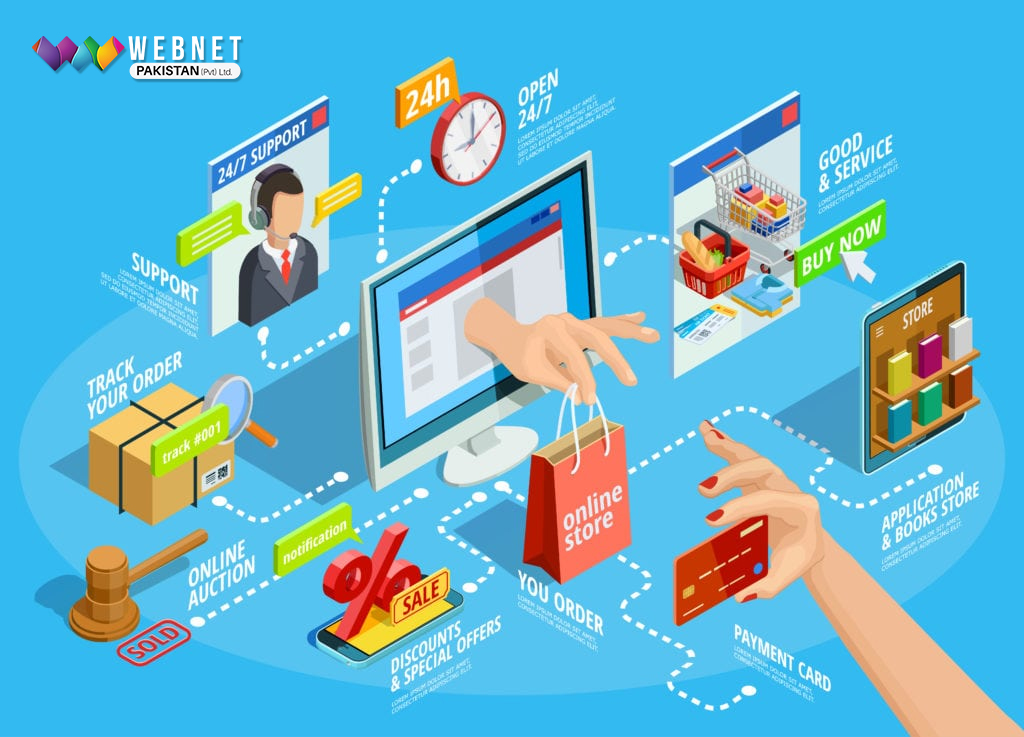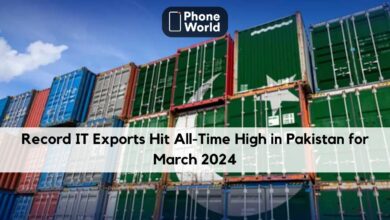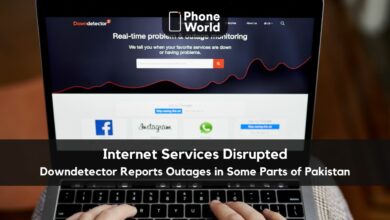Rebuilding Pakistan’s economy through E-commerce

What Is E-Commerce?
E-Commerce is basically commerce that exists in the online world. It involves the online sale, purchase, information and money flow, business dealings and transactions etc. In short, all the economic activity that is catered and directed through the internet comes under the banner of E-commerce. E-commerce today encompasses the entire business world today. It provides the cheapest and most efficient services that may be assumed to be irreplaceable now.
What Are The Uses Of E-Commerce?
Uses of E-commerce involve online banking, business transaction, buying and selling services, electronic data interchange, data collection business to business e-commerce(B2B), Business to consumer e-commerce (B2C), digital wallet, document automation in supply chain and logistics, electronic tickets, enterprise content management, internet security, online auction, online office suites, social networking, teleconferencing, virtual assistants(AI) and domestic and international payment systems.E- commerce has taken a significant and yet irreplaceable position in the business world; whether it be business dealings or household transactions, e-commerce facilitates parties from both ends. Especially, with the arrival of Blockchain technology, the future
of e-commerce has become even more promising.

Impacts Of E-Commerce On Local Market
E-commerce can create adynamic business world E-commerce has revolutionized the local market and evolved it into a global marketplace with no geographical boundaries. It has the potential to introduce a small-scale local business to the global audience and give opportunities for unlimited growth. E-commerce has made the business world dynamic which means that it helps us identify what the next market trend might be and the right time to make an investment. In FY18 Pakistan’s E-commerce industry has been estimated to be at PKR 99.3Bn which raised from PKR 51.8Bn in FY17, with YoY growth of 92%. With a population of approximately 208Mn and several financial inclusion solutions in terms of branchless banking, Pakistan offers one of the largest untapped markets in the world for E-commerce. Although the country has about 71.71Mn broadband subscribers and 69.64Mn 3G/4G subscriptions, E-commerce has still not reached a level where electronic money is predominantly used in place of cash for such transactions. Hence, there is still a lot of room for growth. The pace at which e-commerce market and awareness are growing time is near when Pakistan will become one of the leading countries in the local and international e-commerce market.
In FY18 Pakistan’s E-commerce industry has been estimated to be at PKR 99.3Bn which raised from PKR 51.8Bn in FY17, with YoY growth of 92%
E-commerce is a cost-effective method of business for retailers E-commerce markets means a virtual setup of the business. We can all imagine the magnitude of impact it may have by saving our space, energy, investment cost and labour. As far as retailers are concerned, e-retailing tend to generate more profit than the traditional retailing as it offers products to a greater audience, at a lower price due to the reduced investment cost and with more convenience. Moreover, Traditional retailers base their prices on store traffic and the cost to keep inventory. A drawback for E-retailers here may be that they cannot offer a physical store to gain trust and quality check whereas, traditional retailers may have a physical existence of their brand and also sell it online which not only gives them a much wider audience but also helps them gain trust and convince customers easily to buy their product online.
Where E-commerce is cutting onto digitally unskilled employment, it is also offering new opportunities to digitally skilled employees to not only work locally but internationally without having to move. Skills like web development and maintenance, social marketing, and digital marketing are in high demand in the world of e-commerce.
Moreover, online businesses demand huge warehouses which need to be maintained and require a check and balance. Hence a dramatic increase in the cost of business. E-commerce has made being digitally skilled a necessity. There is almost no good job that doesn’t involve computer work and technological knowledge.
There are about 102, 8646 companies that are registered in Pakistan while the number of unregistered companies is beyond comprehension.
However, even fewer have their websites, serving the functions of cross-border trade or even social media existence. The government should promote website presence to small and cottage industries, which are estimated to be 3Mn SMEs in Pakistan, the majority of them operating in the informal economy. The government can initiate a website development program and plan training workshop for these companies. In this way, companies will get online recognition, whether it be a proper website or any global E-commerce platform. In this way, they may be able to generate around PKR 6,000 per day from their online selling which unanimously adds around $ 1Bn annually to the Pakistan’s economy.
E-commerce may prove to be a very strong weapon against unemployment for Pakistan. Pakistan can increase its GDP by $ 36Bn and create 4Mn jobs by 2025 only by increasing the use of digital financial services. According to several estimates, the online portals such as Daraz.pk could alone create 1Mn, direct and indirect jobs by 2022. Hence, e-commerce can be viewed as the greatest investment opportunity by the Prime Minister of Pakistan to fulfil his words of providing 10Mn jobs for Pakistan’s youth. Pakistan can increase its GDP by $ 36Bn and create 4Mn jobs by 2025 only by increasing the use of digital financial services E-commerce makes the supply Chain process easier and much effective E-commerce directly effects three flows of a supply chain namely physical flow, financial flow and information flow. Physical flow is affected by how the products may be purchased and sold internationally and nationally without having to travel in person from one place to another. You want to see and import things from China in bulk, you need not travel to China to do so anymore, just visit ‘Ali Baba’, negotiate with a dealer of your choice, order a sample of the product and close the deal for your wholesale product to be delivered and it is all at one place in a mobile app by the grace of E-commerce. E-commerce affects the financial flow by making money transactions more simple, secure and fast. Also, the technology is in charge between the two parties to keep a ledger of all the transactions and to ensure safe dealing. Information flow has been the most affected part of the supply chain so far. As we can share, store and receive all information without any doubt.
Business conversations and data sharing is also a matter of a click. This makes it easy to join both ends of the supply chain is a strong, secure and well-calculated knot. Pakistan’s current annual exports are around $24Bn; with e-commerce, Pakistani businesses can expand their market further and enter the untapped markets where the demand for their products is high. This could help solve the country’s economic troubles.
Pakistan’s current annual exports are around $24Bn; with e-commerce, Pakistani businesses can expand their market further and enter the untapped markets where demand of their products is high E-commerce creates unlimited options for consumers E-commerce is a platform to compare prices, judge items by their reviews before purchasing also, a wide variety of brands and products are all at one place to choose from. This means that they have greater control over what they purchase.

However, the drawback of online sales and purchase is the poor judgement opportunity of the product before purchasing it. But as we all know reputation is all that matters in e-commerce. They may be able to trick us once, but they won’t get a second chance indeed! But it seems like technology won’t let that happen any longer. Tommy Hilfiger has started adding Virtual Fit platforms to their e-commerce sites to reduce the risk of customers buying the wrong sized clothes, although these vary greatly in their fit for purpose!
E-commerce can boost tourism industry Pakistan consists of the most scenic beauty waiting to be explored. Through e-commerce world’s attention can be gained. Pakistani tour operators, flight and car services, hotels, and the whole tourism economy can benefit from the adoption of cross-border E-commerce by getting listed on worldwide tourism sites such as Booking.com, Trip Advisor, Expedia and Travelocity(to name a few) and then doing digital marketing by the use of social media to drive international tourists to Pakistan. This may help promote tourism here and provide Pakistan with an additional source of foreign income to benefit from.
This may also revive the spoiled image of Pakistan internationally and open doors to investors. The whole tourism economy can benefit from the adoption of cross-border E-commerce by getting listed on worldwide tourism sites such as Booking.com, Trip Advisor, Expedia and Travelocity to drive international tourists to Pakistan, Establishing an online business, integration of preferred international payment options, cross-border delivery and after-sales service are the four main steps on getting started and being successful with international E-commerce. Pakistan also needs to focus on enhancing its product variety and value addition levels, as future of manufacturing is 3D printing, artificial intelligence, robotics and data analytics, otherwise, it will be further left behind in the international market.
PTA Taxes Portal
Find PTA Taxes on All Phones on a Single Page using the PhoneWorld PTA Taxes Portal
Explore NowFollow us on Google News!





